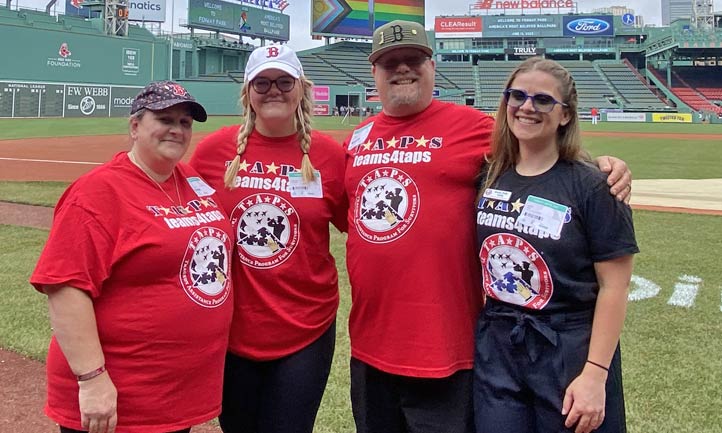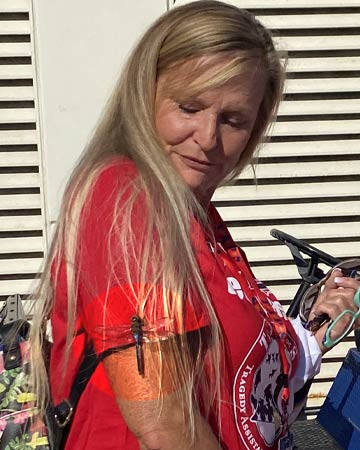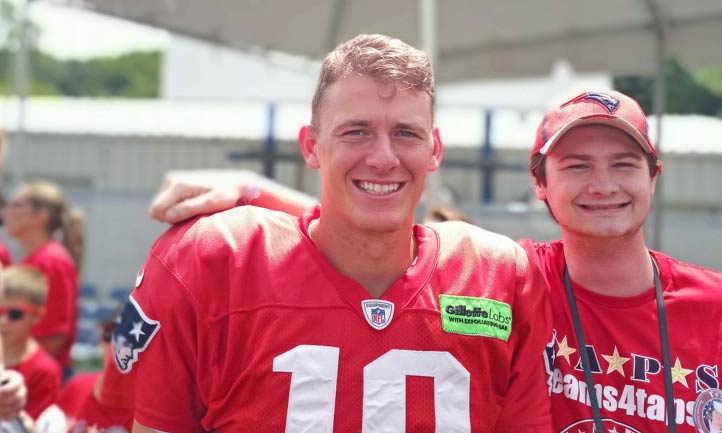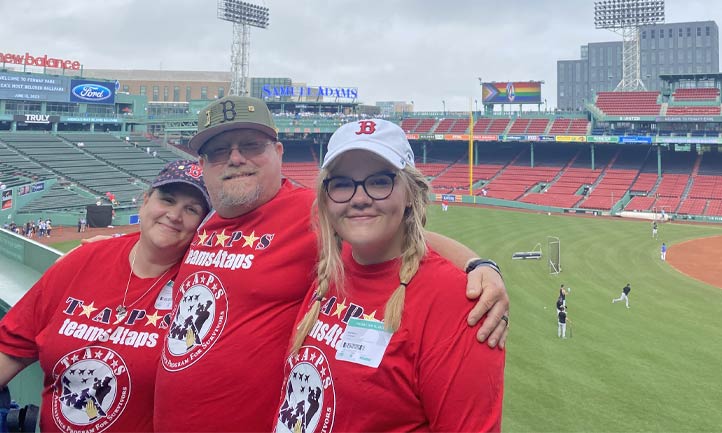Honoring an American Hero at America’s Ballpark
Author: Grace Polk
On October 16, 2003, New York Yankees Infielder Aaron Boone hit a walk-off home run in game seven of the American League Championship Series (ALCS). History repeating for the perennially downtrodden Red Sox Nation — a city of loveable losers lost once again. I was 8 years old. My mom grew up in Dorchester, and as a Massachusetts native, she lived through the dark days — the curse. She carried with her Babe, Buckner, and the rest of the baggage that was, at that point, any Sox fan’s birthright.
Dropping me off at school after that ALCS loss, I hopped out of the car with youthful innocence and optimism, “Don’t worry, Mom, we’ll get ‘em next year.” I don’t recall her response, but she later wrote to my dad, announcing “Another doomed Red Sox fan.”
The following fall, my lucky cap and I kept the faith while my mom paced, sat down, stood back up, walked outside, came back in, sat down facing away from the television, stood up, paced, and repeated. But, as we all know, we did it. We got ‘em — one of the rare incidents in our family history where mom was wrong, and I was right.
I don’t say this to stick it to my mom (though she was wrong), but to provide a brief account of what I consider to be part of my origin story — my roots as not just as a Sox fan, but as a sports fan. My fandom ran so deep that when I started contemplating what to do with my life, the answer firmly became, “I want to work in sports.”

What “working in sports” meant or what in the world it might look like, I had no idea. But, I asked myself the “why” question, and I worked to figure it out. My conclusion: Sports are communal. They provide a rallying point around which disparate groups of people unite in light of a shared love and a common cause. I wanted to harness that power and engage with people meaningfully and authentically through sport.
I was here and there, and then I found TAPS.
Through my work with the Sports & Entertainment team at TAPS, I connect surviving military family members with teams, leagues, athletes, and organizations to help them honor the service and sacrifice of their fallen hero. Engaging with people meaningfully through sport? Check.
At a Los Angeles Chargers practice, I watched a dragonfly land on a surviving mother’s arm and refuse to leave. I sat behind two families at a Washington Nationals game when they discovered that the father from the family on the left was the responding flight paramedic at the very accident in Nevada where the family on the right’s young Marine son was killed. I received an email from surviving parents after a Patriots practice that said they hadn’t seen their son smile like that since his big brother died. Always, I believed in the power of sport, but now I know it’s not just powerful — it’s magical.


Our team plans these events — with the help of our wonderful partners, but those moments? I really had nothing to do with them. What do you call that, if not magic?
Earlier this year, I received an email from the surviving mother of LCpl Thomas Cutcher, U.S. Marine Corps. She wrote of her son, his service, and his love of the Boston Red Sox:
“Tommy was a baseball player. He loved the sport and was a lifelong Boston Red Sox fan. Tommy played Little League and high school ball and was playing on base in his free time. He watched every Red Sox game that he could, though the games often were not shown in California. Tommy had seven months left in his service, and he was looking forward to coming home and finally heading to Fenway to see a game. He had never been there. I grew up in Connecticut and have been a fan all my life. We live in Ohio, and I would take my kids back to Connecticut in the summertime, but we were never able to catch the Sox at home when we were there. Tommy was a heavy equipment operator and had been looking into moving to Boston to work on the docks. He thought that he would, for sure, be able to finally catch a game if he lived and worked there. Sadly, his dream never came true. I never got to share that Fenway experience with him.”
On September 25, 2021, LCpl Thomas Wayne Cutcher was killed in an automobile accident on base while serving at Camp Pendleton, California.
This story would move any member of our team to action, but I felt particularly compelled. For me, the Fenway experience is sacred. It might be old and kind of dirty; the seats might be hard and uncomfortable; if the lights go out, the home crowd might start chanting “Fenway sucks!” (not might, they will — source: my mom), but it is home for Sox fans.

I reached out to the Red Sox and shared the meaningful connection this family has to the team. They were moved by what they read and worked to create a special experience for them. Red Sox owner, John Henry, and his wife, Linda, wrote an incredibly thoughtful letter addressed to the family. Accompanying this note was a touching tribute from the team: a photo of LCpl Cutcher displayed on the video board at Fenway Park. America’s most beloved ballpark recognized the life and service of one of its biggest fans. Though they never got their Fenway moment with Tommy, the Red Sox welcomed LCpl Cutcher’s family to a game in June, where they made precious memories together while honoring their memories of him.
Growing up a Boston sports fanatic with just a vague notion of wanting to work in sports, I never imagined I’d be here — here, on a beautiful June evening in an iconic ballpark that is such a central part of my story, of the Cutcher’s and Tommy’s stories. Here — privileged to bear witness to the healing power of sport in stands and stadiums across the country — it is magic.
Share Your Story
teams4taps wants to help you create magic moments while honoring your fallen hero through sport.
Share your loved one's connection to a favorite athlete, team, or sport by completing the Share Your Story intake form.
Grace Polk is TAPS Sports & Entertainment Senior Coordinator.
Photos: TAPS Archives
